Coordinación
Una coordinación sólida puede evitar vacíos y duplicaciones en las respuestas humanitarias, así como garantizar que los PTM complementen otros tipos de asistencia. Sin embargo, el informe del «Estado Global de los Programas de Transferencias Monetarias» de la CALP Network muestra que la coordinación de la asistencia en efectivo es vista como débil y ad hoc, y que esto está teniendo graves repercusiones operativas.
Los donantes, las ONG y los líderes de los grupos de trabajo de transferencias monetarias (GTM) han pedido claridad sobre tres temas principales relacionados con la coordinación de la asistencia en efectivo:
- Quién debe ser responsable de asegurar una coordinación eficaz de la asistencia en efectivo;
- Cuál es la función y el mandato de los grupos de trabajo de transferencias monetarias, incluso en relación con las transferencias monetarias multipropósito;
- Cómo se debe dotar de recursos a la coordinación de asistencia en efectivo.
Tenemos que basarnos urgentemente en lo que funciona y proporcionar claridad a nivel mundial sobre las preguntas arriba mencionadas, adaptándonos a los diferentes contextos. Hace mucho tiempo que se deberían haber tomado decisiones claras basadas en necesidades operativas y no en la política de las agencias.
Prioridades actuales
El objetivo de la CALP Network es contribuir a seguir progresando en este tema en tres niveles: apoyar a los grupos de trabajo de transferencias monetarias a nivel regional; contribuir a soluciones prácticas para la coordinación de la asistencia en efectivo a nivel mundial; y convocar una discusión basada en la evidencia sobre temas clave, destacando puntos de decisión críticos y oportunidades de progreso.
Contenido destacado

Cash Coordination Tip Sheet
Guidelines and Tools
This tip sheet sets out established best practice, key guidance and resources for all aspects of cash coordination, intended as a clear, accessible and action-oriented guide for those engaged in coordination of cash and voucher assistance (CVA) at the field level.

Introducing the Cash Coordination Tip Sheet
Webinar
The CALP Network has developed a tipsheet setting out established best practice and key guidance and resources for all aspects of cash coordination, intended as a clear, accessible and action-oriented guide for those engaged in coordination of cash and voucher assistance at the field level.

Cash Coordination: A proposal from members in MENA
Blog Post
Earlier this year the CALP Network undertook regional consultations to explore options for cash coordination. This blog lays out recommendations from participants from the Middle East and North Africa who sketched out what cash coordination, and coordination more broadly, could look like in future to support a more effective, efficient and accountable response.
Últimos recursos

New the CALP Network Online Training Course: “E-Transfers and operationalizing beneficiary data protection”
Blog Post
With the increase in the use of electronic transfers (e-transfers) in the humanitarian sector, concerns regarding information management of beneficiaries’ data have risen among humanitarian agencies. Although there are principles and operational standards that provide a framework for the protection of...

The role of Cash Working Group Coordinator: Focus on Bangladesh
Blog Post
Multiple country cash working groups have emerged the past years to encourage the coordination of cash transfers across sectors. Eun Jung Yi, Coordinator of the Bangladesh Cash Working Group, presents some of the key achievements of the group within its first 12 months of existence.

New Publication: “MARKit: Price monitoring, analysis and response kit”
Blog Post
The Local Regional Procurement (LRP) Learning Alliance has launched a new publication “MARKit : Price monitoring , analysis and response kit” aimed to guide food assistance practitioners through the steps to monitor markets during the implementation of food assistance programs, and to ensure that...
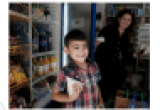
New publication: “MARKit: Price monitoring, analysis and response kit”.
Blog Post
The Local Regional Procurement (LRP) Learning Alliance has launched a new publication “MARKit : Price monitoring , analysis and response kit” aimed to guide food assistance practitioners through the steps to monitor markets during the implementation of food assistance programs, and to ensure that...
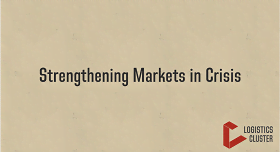
Videos on Cash and Voucher Programming from Logistics Cluster
Video
Market-based interventions is a hot topic in emergency response. The Logistics Cluster has produced several videos to help to explain the key concepts behind cash, voucher and market assistance. Cash and voucher programming is rapidly becoming a modality of choice for humanitarian programmes engaged in...
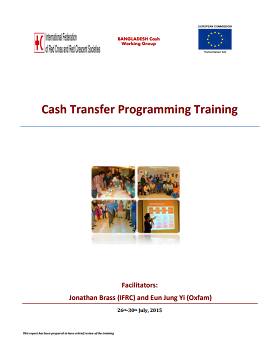
Cash Transfer Programming Training
Guidelines and Tools
IFRC developed this 4-day course on CTP, based on the materials developed by the CALP Network for their Level II training. The course has four modules that aim to cover the whole project planning cycle in relation to CTP, and which is encapsulated in the CTP process referred to in each section of the...
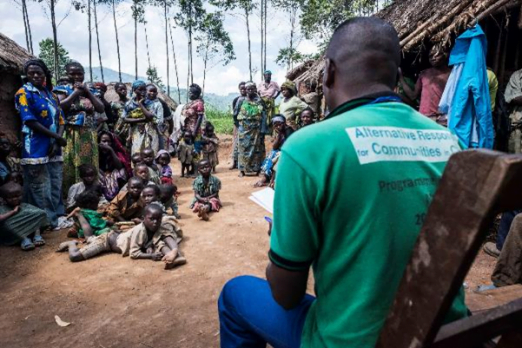
UNICEF’s Alternative Responses for Communities in Crisis (ARCC) programme – The largest Humanitarian Multi-Purpose Unconditional Cash Transfer Program in the DRC
Blog Post
Cash-based Response programs have a long standing history as part of humanitarian response in the Democratic Republic of Congo. Gabriele Erba provides an insight into the ARCC programme and its operational research component looking into the consequence of using different delivery mechanisms and of...

Economic Recovery Assessment
Report
As Ebola cases in Sierra Leone have dropped, the country and policymakers have turned their eyes to the challenging task of economic recovery. While some people are beginning to bounce back from the crisis, others, including petty traders and youth, continue to face reduced sales and limited alternatives...

Protection in Cash Based Interventions – Interviews with Richard Nunn and Lou Lasap
Blog Post
As part of an ECHO-funded Enhanced Response Capacity grant, UNHCR in partnership with WFP, Oxfam GB and the Cash Learning Partnership held an inter-agency workshop on cash and protection in Nairobi on the 10-12th March. The workshop brought together cash and protection practitioners to reflect upon...
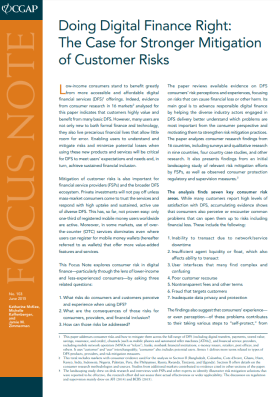
Doing Digital Finance Right: The case for stronger mitigation of customer risks
Policy paper
Low-income consumers stand to benefit greatly from more accessible and affordable digital financial services (DFS) offerings. Indeed, evidence from consumer research in 16 markets analyzed for this paper indicates that customers highly value and benefit from many basic DFS. However, many users are not...
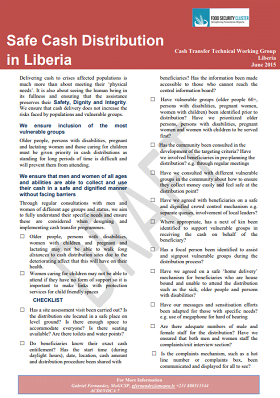
Safe Cash Distribution in Liberia
Report
Delivering cash to crises affected populations is much more than about meeting their ‘physical needs’. It is also about seeing the human being in its fullness and ensuring that the assistance preserves their Safety, Dignity and Integrity. We ensure that cash delivery does not increase the risks faced...
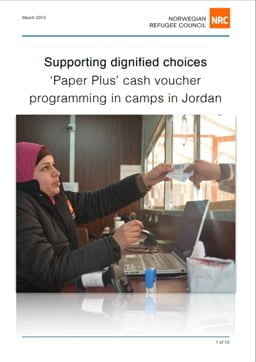
Supporting Dignified Choices ‘Paper Plus’ Cash Voucher Programming in Camps in Jordan
Report
The Norwegian Refugee Council (NRC) in Jordan has directly assisted close to 400,000 vulnerable Syrian refugees in both formal camps and host communities since it began operations in November 2012. NRC is the lead partner of UNHCR in Zaatari and Azraq camps in providing refugees with shelter and the...
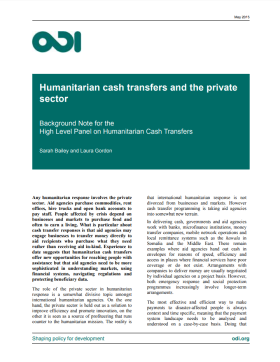
Humanitarian Cash Transfers and the Private Sector
Policy paper
The role of the private sector in humanitarian response is a somewhat divisive topic amongst international humanitarian agencies. This publication discusses the challenges and obstacles to a more effective engagement between the private sector and humanitarian actors as well as the potential role...
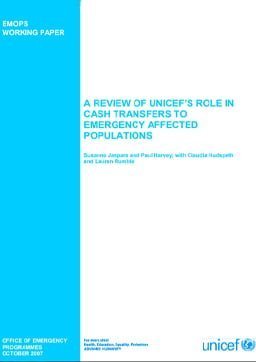
A Review of UNICEF’s Role in Cash Transfers to Emergency Affected Populations
Report
This paper is part of an ongoing process exploring UNICEF’s engagement with cash-based responses in emergencies. The main aim of the paper is to stimulate discussion on the potential role of cash transfers within UNICEF’s response to emergencies.
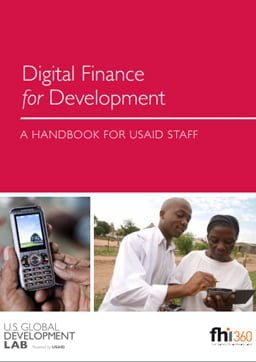
Digital Finance for Development: A Handbook for USAID Staff
Guidelines and Tools
This handbook is designed to enable USAID personnel to maximize the Agency’s use of and contribution to the growth of digital financial services in emerging markets around the world. As an Agency, USAID brings significant comparative advantages to the collective effort required to build out financial...
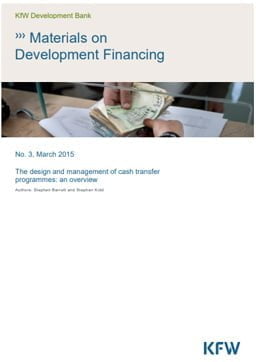
The Design and Management of Cash Transfer Programmes: An Overview
Policy paper
This paper describes and explains the operations of cash transfer schemes, outlining good practice in the design processes required to operationalize policy-level design principles. It describes the four key components comprising the administrative structure of most cash transfer programmes and, based on...
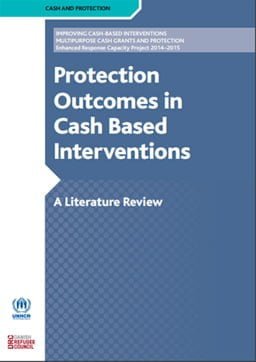
Protection Outcomes in Cash-based Interventions: A Literature Review
Report
This literature review examines existing research to determine whether the use of cash and vouchers is contributing to the promotion of protection and gender outcomes for beneficiary communities, following the WFP and UNHCR 2013 study on gender, protection and cash. This literature review focuses on these...
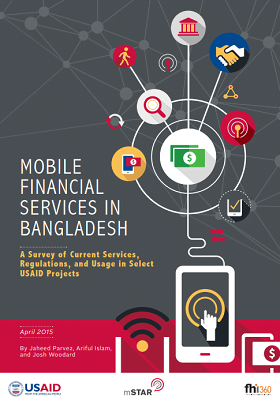
Mobile Financial Services in Bangladesh
Report
This report is the consolidation of findings derived from desk research and face-to-face interviews with key mobile financial services providers, telecom operators, technology platform providers, regulators, and USAID health and agriculture project staff and beneficiaries.
The objective of this report is...

Market Analysis Application in WASH Response
Report
Markets are an important aspect of the livelihood where the majority of the world’s population depend upon. During disaster, market recovery is critical where it indicates the recuperation that livelihood, jobs and businesses rely upon. Humanitarian actors need to factor market analysis into their...
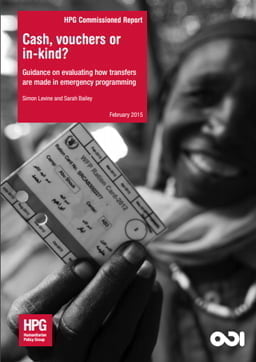
Cash, Vouchers or In-Kind? Guidance on Evaluating How Transfers are Made in Emergency Programming
Guidelines and Tools
In humanitarian settings, aid agencies often assist populations by transferring resources, usually using cash, vouchers or in-kind aid, such as food rations, shelter materials, seeds and tools and kits of household items. The use of cash or vouchers to replace in-kind aid is most pronounced in food...